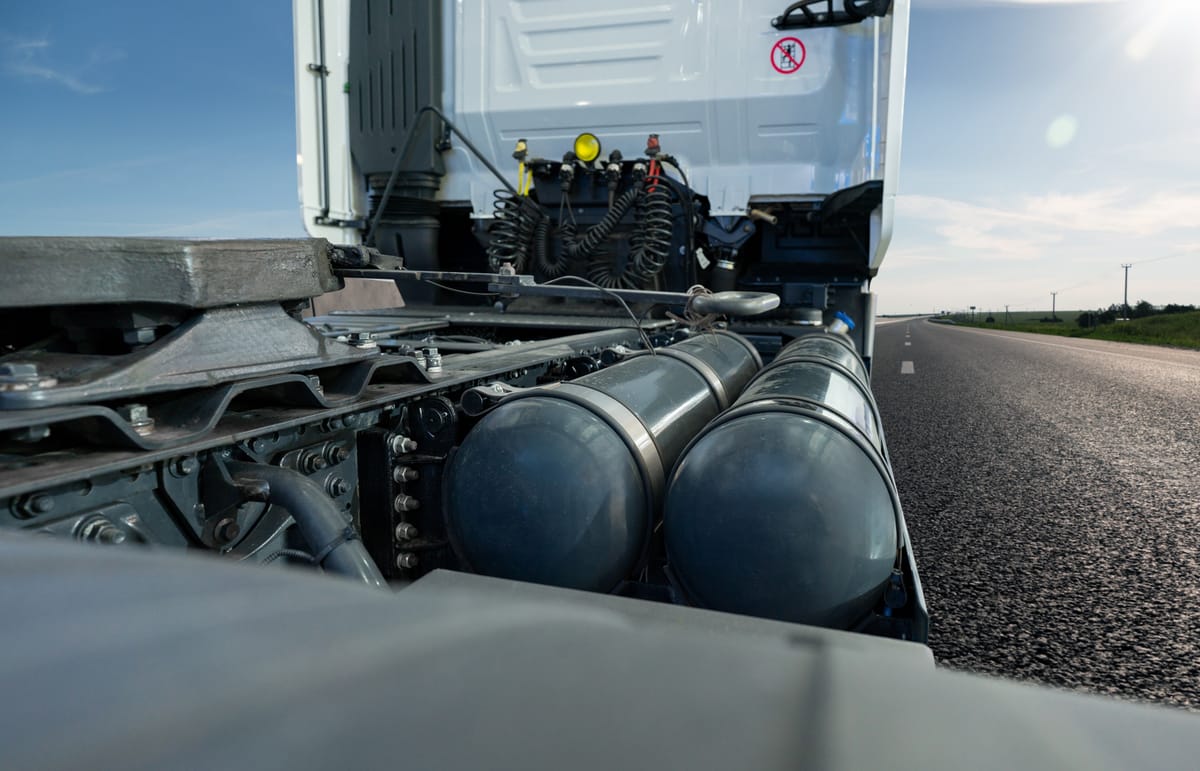Managing chassis in a shifting market
Plus: China's freight bookings up 300% | Texas's effort to mitigate nuclear verdicts

Too little freight, too many trucks. How do fleets find "Goldilocks" in today's freight market? It's all about flexibility and being able to adjust to changing cargo volumes. We talk to the CEO of TRAC Intermodal about how to manage the ups and downs of trucking demand.
Meanwhile, spot rates took a nosedive, but a big rush to order from China could change the narrative for trucking—at least temporarily.
And in tech news, Mack Trucks' new load board (and you don't need a Mack to use it) and is AI the new Google?

Protecting carriers amid big swings in freight volume
Today's freight market is constantly shifting, and with that comes changing equipment needs. One day, a fleet may need more trucks and trailers than it can find; the next, equipment is sitting idle.
That's why flexibility is top of mind for TRAC Intermodal, which provides equipment and manages chassis pools. We chatted with Daniel Walsh, president and CEO of TRAC Intermodal, to understand how the company is working with motor carriers and helping manage the ups and downs of freight volume. -Shefali Kapadia
With tariffs and shifting port volumes, how are you handling the changes? Are you collaborating with trucking firms in any way?
We are offering short-term and flexible options to help motor carriers better manage fluctuating demands. TRAC is using GPS technology to create private pool solutions within a carrier’s infrastructure. This gives a carrier control of a set pool of chassis and, more importantly, availability. This protects carriers from the recent swings in volumes and chassis availability at the ports. When volumes spike and the carriers know they have a set number of chassis on their yard, they can support their customers, providing a distinct advantage over competitors who might struggle to meet demand. When port volumes decline, we have flexible pricing and customers pay for chassis only when they need them. We continue to closely monitor equipment demand, in collaboration with trucking companies, ocean carriers, port and terminal operators, and BCOs. We are actively building strategic chassis reserves in areas where we expect volume to be high, as we have done over the past 18 months.
What's one thing you wish carriers better understood about working with TRAC?
Our willingness to be flexible and work with carriers to meet their needs in an evolving marketplace. We have multiple solutions to help carriers, backed by our commitment to safety and service for our customers. These solutions may include 40-foot chassis or specialty equipment such as tri-axles, combo chassis, expendables and other options. Additionally, as the largest marine chassis pool provider, TRAC has re-entered the 53-foot equipment market. TRAC now offers a domestic chassis pool, domestic chassis term lease and domestic daily hire. All lines are growing nicely and we’re delighted to have successfully reentered this space.
What’s a trend in intermodal or drayage logistics that you think most small trucking companies are underestimating right now?
The amount of volatility in the market, particularly with respect to rates and volume. With significant reductions in volume over the last 30 days, all participants need to be nimble and as flexible as possible with asset costs. Variable leasing options provide balance sheet flexibility while maintaining safe, reliable equipment on the road. A review of public transportation data also suggests that some drayage carriers are engaged in a race to the bottom on rates, which is not healthy for their business nor for the industry long term. There is also a scenario where volume lifts materially in Q3 and we see a large, more traditional peak season. It’s important to ensure companies are ready for that.
What's your No. 1 piece of advice to SMB trucking execs in the current freight market?
Take the volume opportunity when it arrives and aggressively manage costs and long-term risk. There may well be near-term volume lifts as the tariff issue settles and that needs to be harvested effectively. On the risk side, there is a lot of regulation in the market, in some areas more than others, that will have an impact on all carriers. Having a strong balance sheet will help you manage through these regulatory changes. Finally, don’t skimp on safety and quality. Apart from not being the right thing to do, in my opinion, it’s a false economy that will cost you materially in the end.

A multi-pronged approach to powering up fleets
The state of electric trucks is in flux right now, as many states put EV mandates on the back burner and OEMs focus on customer needs.
But rather than seeing EVs as DOA, a "continuous improvement" mindset might be the way to go, says Jeff Seger with the North American Council for Freight Efficiency.
"We are in the Messy Middle because there is no perfect, one-size-fits-all solution for the industry," Seger writes. For some applications, battery-electric makes sense. For others, renewables are a better fit. The two (and more) can coexist.
Why this matters: There are many paths to reduce transportation emissions. EVs have their limitations in trucking, but using them in suitable short-haul applications while innovating in fuel economy and route optimization can push the industry forward in sustainability.
Get more details at CCJ Digital.

LOAD FINDER: Mack Trucks launches load board for carriers
NO FORECAST: Major fleets scrap earnings guidance amid uncertainty
TRANSFER OF POWER: Lucid buys Nikola plants to manufacture EVs
MAN'S BEST FRIEND: Trucker, dog in recovery after crash with drunk driver

"Technology: When you don't know you're using it, that's when it's done its job well."-Josh Turley, RTA: The Fleet Success Company
When Google, Yahoo and other search engines first made their way into our world, it took some time to get accustomed to using them. Now, they're simply ingrained in our day-to-day, and most of us probably couldn't imagine life without them. Turley, CEO of a fleet management software company, thinks the same thing is about to happen with AI. Watch his interview here.

Trucking speaks up on deregulation in DOT comments
The Department of Transportation asked, and trucking answered. The agency called for comments on regulations that could be altered or removed. Respondents named everything from adjustments to the ELD mandate, to changes to hours of service, to greater transparency in brokerage and much more. What would you say?
Why this matters: The trucking industry isn't shy about its disdain for regulations that directly affect fleets' operations. Most existing regulations were enacted to enhance safety, though some critics say the rules create a lack of flexibility and even have the opposite effect on safety. (FreightWaves)
Shippers ramp up China bookings during tariffs pause
Companies in the U.S. are taking advantage of a 90-day pause in tariffs on China by stepping up their shipments. Freight bookings out of China rose almost 300% last week compared to the week before.
Why this matters: The impacts will ripple throughout the supply chain. With a jump in demand, ocean shipping capacity may be constrained, and rates will rise. Port volumes will increase, but could get bottlenecked. Trucking companies may have more volume alongside more congestion. (NBC News)
Spot rates plummet to pandemic levels
Dry van spot rates hit their lowest point since June 2020 in the first full week of May, according to Truckstop and FTR data. But last week's data should show an increase, as higher spot rates are typical during Roadcheck. Moving forward, it's anyone's guess how the 90-day pause on China tariffs could affect rates.
Why this matters: The end of the years-long freight recession that many analysts predicted and trucking executives cautiously hoped for has yet to materialize. Uncertainty around tariffs, prices and the economy has only prolonged low rates. (Truck News)

Texas bill would restrict past evidence in early trial phases
A Texas bill related to lawsuits and commercial vehicle crashes is getting mixed reactions. The regulation would limit the types of evidence that attorneys can present to juries during the first phase of a trial. Business groups are in favor of the bill, saying it would stop jurors from being influenced by a fleet's history, while attorneys and law enforcement are pushing back.
Why this matters: Nuclear verdicts and massive jury awards against trucking firms have been on the rise, and trucking advocates want to stop unfair prejudice from entering juries' minds. But opponents argue the bill would decrease safety and potentially protect bad actors. (KBTX)

Thanks for reading today's edition! You can reach the newsletter team at editor@theinsidelane.co. We enjoy hearing from you.
Interested in advertising? Email us at newslettersales@mvfglobal.com
The Inside Lane is curated and written by Shefali Kapadia and edited by Bianca Prieto.





Comments ()